Federal Judge Rules Terrorist Watch List Unconstitutional
A Federal Judge in Virginia has found the terrorist watch list unconstitutional.
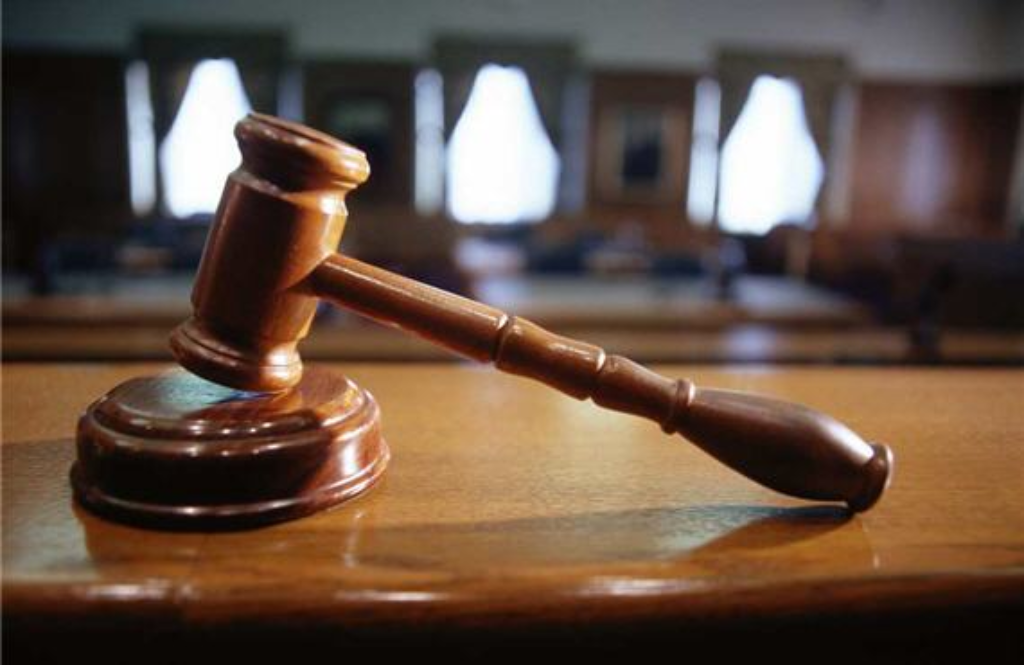
A Federal Judge in Virginia has ruled that the Federal Government’s terrorist watch list, which has been used to keep people from getting on airplanes as well as to justify law enforcement surveillance, is unconstitutional:
WASHINGTON — A federal judge ruled on Wednesday that a federal government database that compiles people deemed to be “known or suspected terrorists” violates the rights of American citizens who are on the watchlist, calling into question the constitutionality of a major tool the F.B.I. and the Department of Homeland Security use for screening potential terrorism suspects.
Being on the watchlist can restrict people from traveling or entering the country, subject them to greater scrutiny at airports and by the police, and deny them government benefits and contracts. In a 32-page opinion, Judge Anthony J. Trenga of United States District Court for the Eastern District of Virginia said the standard for inclusion in the database was too vague.
“The court concludes that the risk of erroneous deprivation of plaintiffs’ travel-related and reputational liberty interests is high, and the currently existing procedural safeguards are not sufficient to address that risk,” Judge Trenga wrote.
As of 2017, about 1.2 million people were on the watchlist, which is maintained by the F.B.I.’s Terrorist Screening Center. Although a vast majority of them were foreigners abroad, about 4,600 were American citizens who are protected by the Constitution.
Among them, a group of 19 Americans, represented by the Council on American-Islamic Relations, filed a lawsuit charging that their inclusion violated their due process rights. Recounting tales of being detained and harassed when trying to enter the country, they argued that they did not receive notice of why they were being put on the list or an opportunity to contest derogatory claims.
The judge agreed that the current procedures were inadequate to protect their rights, granting the plaintiffs summary judgment. But he stopped short of saying what should happen next, asking the Justice Department and the lawyers for the plaintiffs to submit briefings on the difficult question of “what kind of remedy can be fashioned to adequately protect a citizen’s constitutional rights while not unduly compromising public safety or national security.”
The Council on American-Islamic Relations hailed the ruling as a “complete victory.” In a statement, Nihad Awad, its executive director, said the group’s “legal team has finally brought an end to the secretive watchlist, which is effectively a Muslim registry created in the wake of the widespread Islamophobia of the early 2000s.”
Joshua Stueve, a spokesman for the United States attorney for the Eastern District of Virginia, declined to comment. But in court, government lawyers had argued that the case should instead be dismissed. Among other things, Justice Department lawyers asserted that the plaintiffs lacked standing to bring the case, and they urged Judge Trenga to defer to the executive branch’s decisions because combating terrorism was a national security matter.
(…)
The present case involves a broad watchlist, called the Terrorist Screening Database. It is maintained by the F.B.I., but other agencies can nominate people for inclusion on the list based on intelligence that may never be shared with them.
A subset of the people on the watchlist are also put on the more restrictive No Fly List, which bars them from boarding planes in the United States or flying through American airspace. In 2014, a federal judge in Oregon ruled that the government’s use of the No Fly List to bar Americans from boarding planes was unconstitutional, requiring the Department of Homeland Security to overhaul its Traveler Redress Inquiry Program procedures.
Later that same year, Judge Trenga struck down a use of the No Fly List to keep a particular American, Gulet Mohamed, from boarding a flight home, effectively exiling him. The judge’s ruling about the broader watchlist on Wednesday built on his earlier opinion, which he quoted from extensively.
Judge Trenga noted that most of the plaintiffs in the current case did not claim to be on the more restrictive No Fly List, but said their inclusion on the broader Terrorist Screening Database — which he referred to by the initials TSDB — raised similar issues because of the burden of going through the delays and humiliations of enhanced screenings that led some plaintiffs to avoid traveling.
“While inclusion in the TSDB does not constitute a total ban on international travel in the same way that inclusion on the No Fly List does,” he wrote, “the wide-ranging consequences of an individual’s watchlist status render it more closely analogous to the No Fly List than to the types of regulations that courts have found to be reasonable regulations that still facilitated access and use of means of travel.”
More from The Washington Post:
A federal judge ruled Wednesday that an FBI watch list of more than 1 million “known or suspected terrorists” violates the constitutional rights of U.S. citizens in the database.
The decision from U.S. District Judge Anthony J. Trenga of the Eastern District of Virginia in favor of 23 Muslim Americans who sued over their inclusion in the Terrorist Screening Database found that the watch list infringes on their constitutional right to due process. Trenga noted that the list restricts their ability to fly and engage in everyday activities and backed the plaintiffs’ concerns that they were flagged secretly and without a clear methodology.
“There is no evidence, or contention, that any of these plaintiffs satisfy the definition of a ‘known terrorist,’ ” wrote Trenga, adding that even harmless conduct could result in someone being labeled as a “suspected terrorist” on the watch list.
“An individual’s placement into the [watch list] does not require any evidence that the person engaged in criminal activity, committed a crime, or will commit a crime in the future,” the judge wrote, “and individuals who have been acquitted of a terrorism-related crime may still be listed.”
The ruling could reshape the government’s process for a watch list that has long been criticized for inaccuracy and described by opponents as “a Muslim registry created in the wake of the widespread Islamophobia of the early 2000s.” Trenga ordered both the plaintiffs and defendants to submit arguments about how to fix the constitutional problems with the database, which encompasses nearly 1.2 million people, including about 4,600 U.S. citizens or residents, as of June 2017.
Trenga’s 32-page opinion was hailed as a significant win by the Council on American-Islamic Relations, the civil liberties organization that filed the lawsuit in 2016.
“Innocent people should be beyond the reach of the watchlist system,” Gadeir Abbas, a CAIR attorney for the plaintiffs, said in a statement. “We think that’s what the Constitution requires.”
(….)
Anas Elhady was returning to the United States after a brief trip to Canada in April 2015 when he was surrounded by Border Patrol before he was handcuffed and interrogated for more than 10 hours. During this time, he needed emergency medical attention. Elhady would be detained at least two other times at the border, and on one occasion an FBI agent told him his cellphone conversations were being monitored, according to the opinion.
“When Elhady attempted border crossings, [Customs and Border Protection] officers told him, ‘Are you serious? Someone like you should have stopped crossing the border by now,’ ” wrote Trenga, a 2008 appointee of President George W. Bush.
Hassan Shibly, a plaintiff who works in CAIR’s Florida chapter, said he has been searched dozens of times because of his inclusion in the database. Once he was handcuffed by authorities in front of his grandmother near a border crossing in Detroit.
“It’s humiliating,” Shibly told the AP in April. “The government lawyers could never make the arguments they made … if they had personally faced the same treatment we’ve faced.”
Another plaintiff, Hassan Fares, said the secrecy of the watch list had him questioning whether his struggle to open a bank account stemmed from his placement on the list.
“It’s difficult to determine whether it’s random or whether it’s [connected] to something else,” he said to the AP. “Suspicion just leads to paranoia.”
Abbas also argued that the broadly disseminated database — which grew from 680,000 people in 2013 to 1.16 million in 2017 — was worthless in stopping terrorism.
As noted, the list at issue in this case is different from the so-called “No-Fly List” that has been used for the past decade and a half to bar people from flying on either domestic or international flights. Despite that, as the opinion notes the database in question has been utilized for a number of purposes, including detaining people seeking to enter the country and, allegedly, for surveillance purposes by law enforcement.
As with the no-fly list, though, this much broader list suffers from due process problems that make its continued use by the government problematic, to say the least. The primary problem with both lists has been the fact that law enforcement has never specified exactly what criteria it uses to place individuals on the list nor does it specify what, if any process, a person on the list can undertake to either find out if they are on the list or to challenge it if they are on it. Indeed, much like the original version of the no-fly list there appears to be no process at all permitting a person on the list to find out if they are on the list, why they are on it, or to petition to have their name removed if they believe the placement on the list was improper or unjustified.
Because of these defects, Judge Trenga, who was appointed to the Federal bench in the closing months of George W. Bush’s Presidency, found that the program violated the Plaintiff’s due process rights under the Constitution. If this ruling is upheld on appeal, then it would mean that the list will need to be revised, either via legislation or regulation, to provide a basis for persons to determine if they are on the list, the basis for their inclusion, and a means of getting off the list. For now, though, it seems obvious that the government will appeal the matter to the Fourth Circuit Court of Appeals and perhaps beyond that.
Here’s the opinion:
Elhady Et Al v. Kable Et Al by Doug Mataconis on Scribd

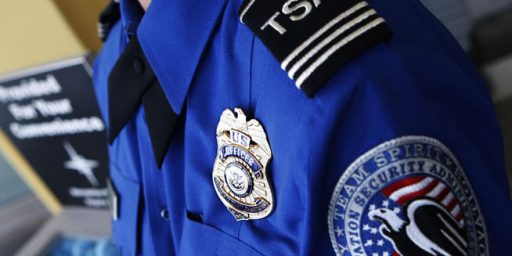
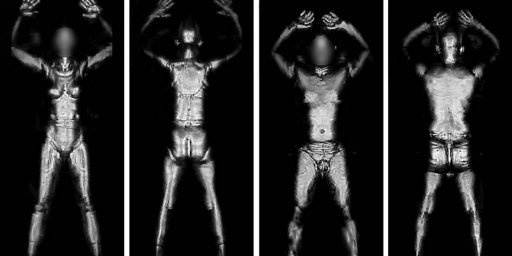
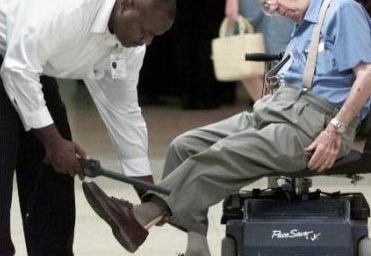
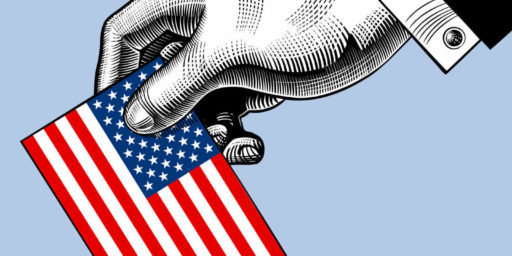

These kinds of cases make good litmus tests for whether people actually believe in freedom/liberty or whether they just want to be left alone to do unto others as they see fit and get a free ride. People who really believe in the Constitution are willing to give up some safety to protect the freedoms enshrined there. (Setting aside the question of whether the current programme of DHS kabuki actually makes anyone safer…)
“The PATRIOT Act” could not have been more ironically named had it been called “The Freedom Through Cowardice Act”.
Of particular note is the Rahinah Ibrahim case back in 2014, where a woman ended up on the list because someone at the FBI checked the wrong box on a form and the FBI went to court rather then admit it screwed up. The case became super ridiculous when they started adding all of the plaintiff’s witnesses to the list as well to keep them from being able to testify at trial.
I was floored by this:
Granted I’m not a lawyer, but don’t the people affected directly by a policy have all the standing they need to bring suit?
@Kathy:
Recently the courts have ruled that plaintiffs in several high profile cases lacked standing, some of these rulings were, curious. I suspect that the justice department is fishing for such a ruling.
@DrDaveT: This is why I think people on the No Fly List (and possibly the broader Terrorist Watch List) should be barred from owning guns. Not because I am deeply worried about terrorism, but because I want to align the most angry right wing “I got rights” crowd with any group having their rights restricted.
Make the NRA useful for something. Or marginally reduce the number of guns out there, particularly to people who have a higher than average chance of being up to no good. Either seems like an improvement.
(I have faith in my government to identify potential terrorists better than throwing darts at a population list… not sure how much better, given the lack of transparency and the known errors)
@Gustopher:
They should also include Registered Democrats.
I remember Sen. DiFi and the Democrats were campaigning to add Due Process to those secret Government lists to push the No Fly/No Buy law.
I vote we start a new registry. We’ll call it the Kool-Aid Registry. Paul’s not allowed to have any anymore.
@Paul L.: I’m not familiar with Feinstein’s work in that area, but it has generally been the Republicans who are opposed to due process on those lists. Democrats, as a rule, realize that there are problems. And Democratic leaning interest groups, like the ACLU.
Republicans, as a rule, only see problems when someone considers white nationalists a terrorist threat.
I’m also open to denying people on the terrorist watch lists drivers licenses to force proper scrutiny, but people need to be able to drive in much of the country. Almost no one needs a gun.
@Gustopher:
Feinstein and the Democrats lost interest in fixing and adding Due Process to the secret government lists when they could not longer use them to resist gun ownership.
@Jax:
Jim Jones was a progressive.
I was on the no fly list for awhile. Or at least someone with my very common name was. I asked how to get off the list and was told all I could do was check in at the counter with my passport to show I wasn’t the other guy.
@gVOR08:
gVOR08 is not a common name.